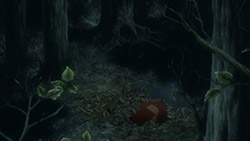 |
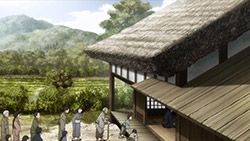 |
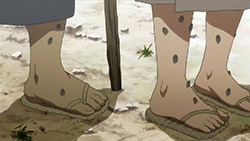 |
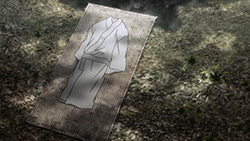 |
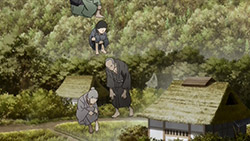 |
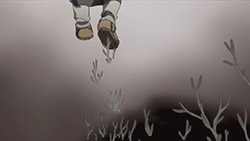 |
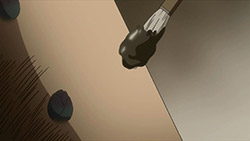 |
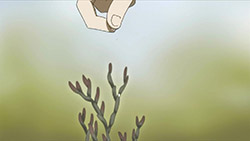 |
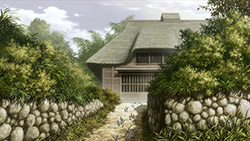 |
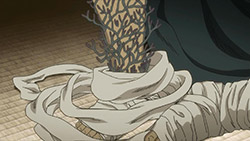 |
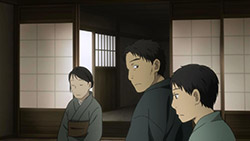 |
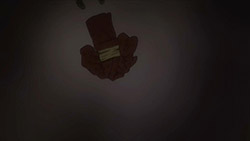 |
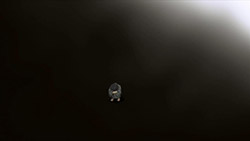 |
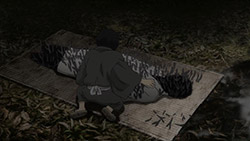 |
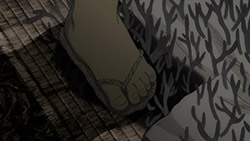 |
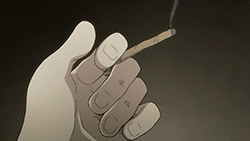 |
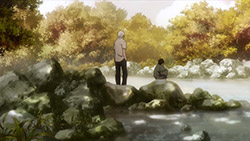 |
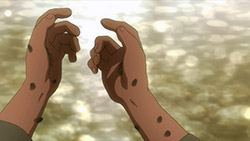 |
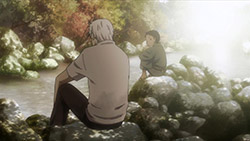 |
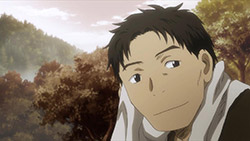 |
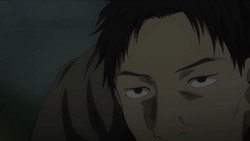 |
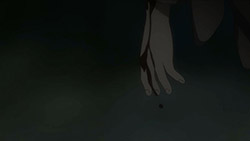 |
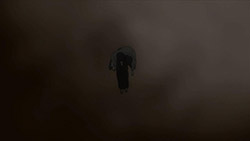 |
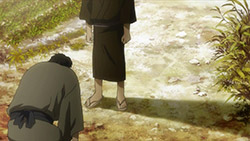 |
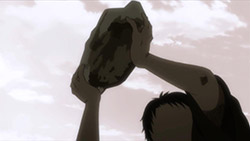 |
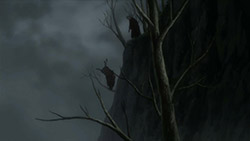 |
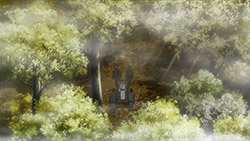 |
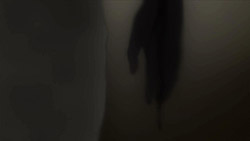 |
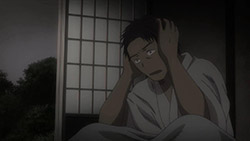 |
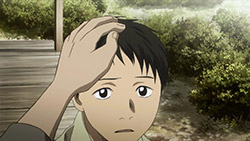 |
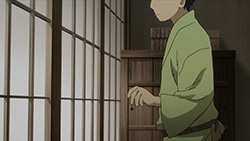 |
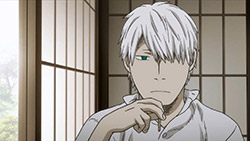 |
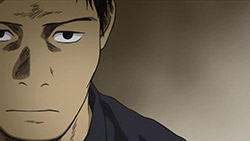 |
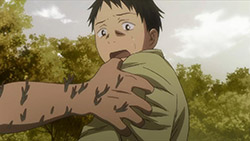 |
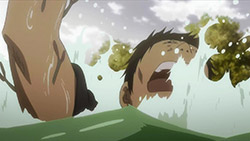 |
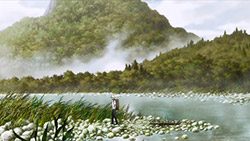 |
「泥の草」 (Doro no Kusa)
“Mud Grass”
It seems that mood of Mushishi this season is as a gentle roller coaster, climbing up with heartwarming episodes and then sliding back down into morbid territory. One can think of Zoku Shou as running like a gradient, with each episode blending into the next thematically but shifting in colour with each time. Mud Grass is perhaps the darkest of Mushishi we have seen to date. I thought last week’s episode was pretty sombre, what with it being about domestic breakdown and all, but this week manages to go one further. Mud Grass is about murder, and as expected it’s not a subject that is dealt with lightly.
Death hangs heavily over this week of Mushishi, and the body count is uncharacteristically high. In the tight-nit, rural communities of Mushishi, humans do not deliberately kill each other—at least, we haven’t seen it happening before. And where Mushishi has framed death as being something to be respected before, only now does it invoke it as something so feared. The villagers of this episode have their funeral rites because of the symbolism of returning to the mountain (and remember that in Mushishi mountains represent the greater life-cycle), but they also have superstitions attached to them. Their fear is not unfounded; corpses can spread pestilence, parasites and other nasty things (i.e. zombies), which is why we usually bury or burn corpses. For this particular village, even handy decomposition-by-mushi carry some rather sinister dangers.
The mokurosou introduced this episode may look like grass, but as a narrative motif it acts awfully like blood. ‘Out, out, damn spot!’ I could almost hear Lady Macbeth shouting, constantly scrubbing at that phantom reminder of her crime. Like Cain, the biblical first murderer, once you kill you are marked forever. Fittingly, there is a lot of contemplation of hands in this episode of Mushishi, and what it means in each specific circumstance is up to interpretation (much like all the clouded expressions). What’s obvious is that murder has lasting and profound effects on all involved. In anime, I am reminded in particular of Kara no Kyoukai, where murder is treated as something that explicitly erodes your humanity. Even killing once makes killing an irreversible part of your identity. It’s so easy to just keep killing as the crimes spiral out of control.
Note the difference between the two brothers. One kills by accident, the other out of vengeance. One eventually confesses his crime, while the other continued to cover it up. And only one, in the end, gets the proper mountain funeral. It’s also notable that even suspicions of murder does not stop Ginko from treating a patient. His end is his own doing. If there ever was a hell in Mushishi, then drowning ignominiously, unable to be returned to the mountain, resting with neither friend nor family, is it. But he wasn’t even a particularly evil man. He had a wife. He loved his daughter. He cared for his nephew. Such a mundane man committing such a cold-blooded crime and destroying his life was a chilling thing to watch. Good though it was, I hope Mushishi doesn’t intend to top it every week.
Preview
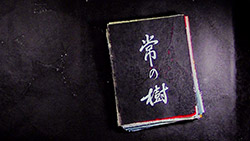 |

I think the recurring message here, similar to an episode regarding murder in xxxHolic is this; while you’re free to do the crime, you can never wash away the heavy sin (or in this case, the stench) that comes with it. This was apparent when Ginko said the Mokurosou thinks the uncle smells like death, even though he’s alive. And this was doubly obvious when he immediately heads off to the river to wash himself.
I’m having a hard time deciding whether I side with the choices Ginko made in this episode. I know he doesn’t intervene and I love the fact, that he understands and respects human nature, but leaving a child with his fathers murderer is just…urgh! I wonder if he believes in redemption, for himself and for others…
Perhaps the mushi-shi, or just Ginko himself, has some sort of Hippocratic Oath. Ginko only has suspicions of murder, and even then he’s only an outsider to the village. Ginko does seem to be the kind who likes to meddle, but sometimes a healthy level of professional discretion is wise.
Interesting point, I’ve never really considered that.
Now that I think about it, have we been given any sort of information regarding the mushi-shi and how they are selected and organized? We’ve gotten bits and pieces about their communication methods and their “black” market deals, but nothing of consequence. Seems pretty shady if you ask me, especially with the way some of them used Ginko in the past.
We’ve seen specific instances of how they’re selected and organised, how they trade, how they communicate, how they answer to the Karibusa family, but all in all the mushi-shi are a fairly enigmatic bunch. No two mushi-shi we’ve seen have really been the same. They’re all distinct individuals, just like normal people.
If I were to attribute a color on the gradient for this episode, it would be pitch black. Contrary to an average episode of Mushishi where it is more calm and relaxed (even during the more emotional episodes), this one is really tense and dark since it dealt with murder.
I find the imagery of the Mud Grass as a metaphor for how you can’t wash your sins away to be rather disturbing. There’s something disgusting about seeing those things growing out of your body. That ending scene was also really powerful and even more so knowing he was once a loving father.
https://randomc.net/image/Mushishi/Mushishi%20Zoku%20Shou%20-%2019%20-%20Large%2033.jpg
This is about as close as I see Ginko being potentially murdered had he not kept his objective and professional stance. That is a facial expression of a twisted man who is not afraid to repeat his actions.
It’s interresting how Mushishi’s refusal to judge made this episode even darker.
Thinking that anyone can become a murderer given the right (well, wrong in this case) circumstances is a pretty terrifying thought. The death of his wife clearly left him a broken man, no matter how he tried to hide it.
And murder leads to murder, no matter if it is accidental.
If you think about that poor kid’s life for now on, it’s truly heartbreaking.
I don’t see any hope in his future. (If he ever have one, because he was letting himself killed by the Mud Grass
I think it’s as dark as Mushshi can get before losing its specificity.
And he is afraid of his actions. He opened a door he shouldn’t have and now there’s no turning back for him (or at least that’s what he think.)
How long has it been since we saw someone doing something like this (murder) in this series?
Cold-blooded murder? It pretty much never happens in Mushishi. The closest we really get, in recent memory, is episode 06 of the Zoku Shou.